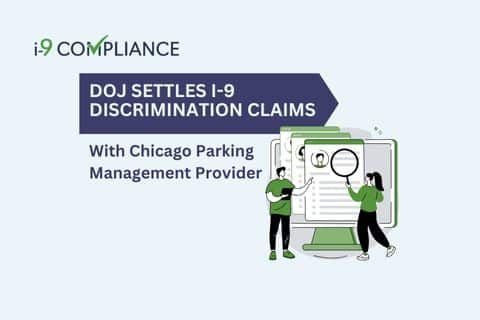DOJ Settles I-9 Discrimination Claims With Chicago Parking Management Provider

The Department of Justice (DOJ) has reached a settlement agreement with a parking management company based in Chicago. This settlement addressed claims of discrimination that occurred during the company’s employment eligibility verification (Form I-9) process. As such, it resolved the claims that the company discriminated against a worker by requesting additional unnecessary documents after receiving valid documentation.
According to the case, the plaintiff complained to the DOJ that the company rejected her work authorization documents. The DOJ responded by having the Civil Rights Division’s Immigration and Employee Rights Section (IER) investigate the complaint and confirm the transgression. The IER confirmed that the employer denied the worker’s facially expired employment authorization documentation (EAD), which the worker received as a beneficiary of temporary protected status.
Though expired, the EAD remained valid under a Federal Register notice that automatically extended its validity. The DOJ stressed that TPS beneficiaries may work in the United States with valid EADs, some of which may have received extended permission despite the expiration date on the documents. However, the company rejected the documents because it listed the worker’s country of birth as the Bahamas despite the worker receiving it as a TPS beneficiary from Haiti.
The federal government has instructed employers completing the Form I-9 to review the category code and date of expiration to verify their extensions. Furthermore, employers cannot consider an individual’s country of birth or other national origin indicators when assessing their employment eligibility.
According to Assistant Attorney General of the DOJ’s Civil Rights Division, Kristen Clarke, “It is unlawful for employers to reject a valid document showing someone’s permission to work because of where the person was born. The department is committed to protecting workers from national origin discrimination in the hiring process and eliminating unnecessary barriers to employment.”
The Immigration and Nationality Act (INA) prohibits employers from discriminating against applicants or employees in the hiring, firing, or recruitment processes. Examples of such discrimination included citizenship status or national origin. The IER enforces this anti-discrimination provision.
Under this settlement, the employer must pay the federal government a civil penalty of $2,000. It will also provide back pay and reinstatement to the affected worker and train its workers on the INA’s anti-discrimination requirements.
As proven in this case, compliance with I-9 regulations has proven challenging. One way to ensure compliance is by using an electronic I-9 management tool. This tool provides guidance throughout the employment eligibility verification, offers convenient digital storage, and can notify employers when to take further action.
Learn more about automating your employment eligibility verification and ensuring compliance with I-9Compliance.